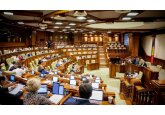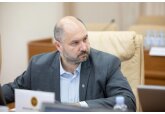
More than 10 billion euros are needed to improve the energy efficiency of Moldova's residential sector, which would lead to a 45% reduction in heating and electricity bills.
According to the Ministry of Energy, these are the findings of the Concept of the Residential Energy Efficiency Fund presented to commercial banks in the country. The concept aims to reduce the energy bills of domestic consumers through significant investments in residential energy efficiency. The fund will be financed equally through a financial commitment scheme, external grants and direct contribution from homeowners (own money/borrowed from banks/transfers from the Energy Vulnerability Reduction Fund). It is noted that the financial commitment scheme is at the final stage of development and will involve redirecting a certain percentage of energy operators' revenues, including from the oil market, to the Residential Energy Efficiency Fund. These funds will be used to renovate both public buildings and private buildings or residential apartment buildings. In 2024, the first 20 apartment buildings will be renovated, in which the internal heat carrier distribution networks have been changed from a Soviet-type vertical installation to a horizontal network that allows temperature regulation for each apartment from a meter in the stairwell. Heat insulation of buildings, roofs, ceilings, basement insulation, etc. will be carried out. Energy Minister Victor Parlicov invited the members of the Moldovan Banks Association to be more open in terms of financing energy efficiency programs, suggesting that these programs should be developed by energy service providers, such as Termoelectrica and CET Nord, as the representatives of the financial system are skeptical about contractual relations with homeowners' associations. In this context, bank representatives referred to the bad experience of the past, when the Chisinau Municipal Council guaranteed such loans in the case of some apartment buildings, but the documents were annulled by the courts. The parties agreed to return to the negotiating table to establish risks and guarantees for future energy efficiency projects in residential buildings in case the beneficiaries fail to fulfill their obligations. According to the banking sector, such products are considered unreliable and restrictive financing rules apply to them. //25.07.2023 - InfoMarket.







